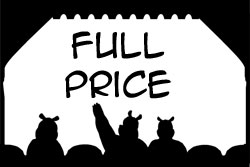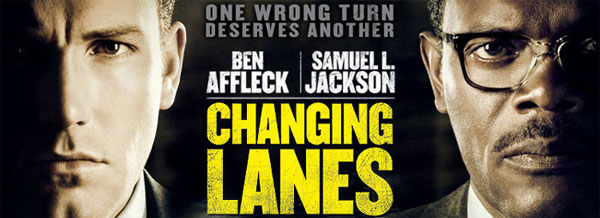Changing Lanes – A Jaded and Biased Review
“Late for court, an attorney weaves in and out of traffic. In a different lane, a father who’s right to see his children rests on getting to court on time. A minor accident will turn these two strangers into beasts.”
I first saw “Changing Lanes” when it was released in theaters back in 2002. At the time, I was a wide-eyed 22 year old working on getting my Human Services degree. When I left the theater neither I, nor any of my friends, really knew what to make of it. We didn’t even know if we liked it or not. However, I remember thinking of it often in the following weeks. And in all honesty, even though it’s a movie that has stuck with me and I still occasionally think about philosophically, I had never watched it again until this review.
The story revolves around Gavin Banek (played by Ben Affleck) and Doyle Gipson (played by Samuel L. Jackson). Banek is a successful New York attorney while Gipson is an insurance salesman, and recovering alcoholic trying to put his life back together.
Banek is in a rush to court to file a power-of-attorney document, which will prove a dead man signed his foundation over to Banek’s law firm. He has a collision with Gipson’s car. Gipson is also in a rush to court for a hearing to try to gain custody of his children and to prevent his estranged wife from taking them to Oregon. In his haste, Banek tries to just give Gipson a blank check. Gipson refuses to accept the check and voices his desire to “do the right thing”, that is, filing a police report and insurance claim. Unfortunately, Banek drops the power-of-attorney papers while writing his check and tells Gipson, whose car is inoperable, “better luck next time” and leaves him stranded.
Both men arrive late for their court times. Banek (who lost the file at the scene of the accident) is told by the judge to re-obtain the papers and present them by the end of the day or be charged with fraud. Meanwhile, Gipson (who has the documents) learns that the judge in his case, sick of waiting for him to arrive, granted custody of his children to Gipson’s ex-wife in his absence.
At this point, Banek does not know who or where Gipson is but runs into him by happenstance and asks if he can get the papers back. Gipson, angry at Banek for making him miss his custody hearing, refuses to return the papers to him telling Banek “better luck next time”. Â This leads to an ever increasing downward spiral of cruel deeds towards each other.
To me, this movie is a very fascinating multi-layered character study as well as a great example of the butterfly effect chaos theory. There really aren’t any true villains or heroes. There are only darkly flawed victims of circumstances, brought on by themselves and outside forces, who believe they are operating on the right side because they are doing the greater good. Which one you consider to be the protagonist, if you even feel there is a protagonist in this movie, is really a matter of opinion. This is by design. It’s a concept that is very difficult to pull off and “Changing Lanes” does it very well!
When I first saw this film I sided with neither character. But as the weeks and months passed, I sided with Samuel L Jackson’s character Gipson. I felt that, yes he was a bit out of control and yes he went too far, but he was fighting to keep his life and family together and was just pushed to the brink. And I really thought Ben Affleck’s Banek was just doing his job and was the one who pushed things too far. Did Gipson bring this on himself? What about Banek? I now feel the answer to both questions is that neither one is completely responsible, but much of the blame for the trouble that happened to them is their own fault for acting out of anger and desperation.
Watching this movie now (10 years later) my perspective is different. I have become disillusioned with the so-called noble causes that I worked for, having seen the dark side of the business world. I may or may not have done a few things for companies that certain government agencies would frown upon in the name of “the greater good”. At this point, I can understand Banek’s plight and confliction much more.
While I really like this film, the movie does have its flaws. Some of the acts that Banek and Gipson pull, as well as their reactions to them, stretch my suspension of disbelief nearly to its limit. Sometimes in this film they can get a little heavy handed with their “nobody is completely good or bad” message. Also, I feel that the Hollywood happy ending really hurts the film. The movie, and its message, would have been a lot stronger had the movie concluded at the scene in the restaurant. In the end this is a thought-provoking film with solid acting by the entire cast. I can’t recommend it enough.

Rating: Full price
It may not be a film worth staying up late for, waiting in line and suffering through fatigue the next day. However, I do consider it a must see
Fun Factor: 55%
This is more of a thought-provoking, rather than entertaining, film.
Sincerely, THE Brian
comments powered by Disqus
